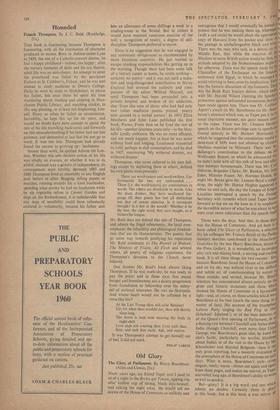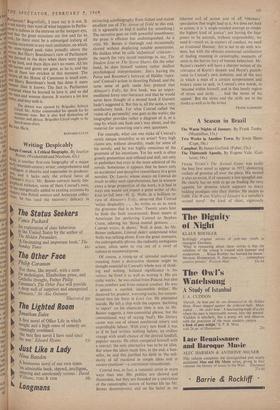Old Glory
The Glory of Parliament. By Harry Boardman. (Allen and Unwin, 21s.) MANY years ago, my friend Taper and I used to sit of a night in the Brebis qui Tousse, sipping cup after endless cup of strong, black kitschensaft, and talking the night away. He would tell me stories of the House of Commons so unlikely and outrageous that I would eventually be moved 5') is protest that he was making them up, whereup0 11. (with a sad smile) he would pluck the appropriate a copy of Hansard from his pocket and show the passage, in unchallengeable black and There was the man who said, in a debate on Ii Middle East, that while the reaction of v Muslims to some British action would be thus, the 1 attitude adopted by the Mohammedans might V far otherwise. There was the speech made by (7
he c
Chancellor of the Exchequer on the financigi settlement with Egypt, in which' he managed I° s avoid referring to Suez, even by implication. 1-10 was the historic discussion of zip-fasteners. VI° I
was the Bank Rate Inquiry debate, which enu7. with Mr. Harold Wilsoli claiming the Speaker' protection against unfounded accusations that "',
been made against him. There was Mr. Cuthber'
Alport's attack on Mr. Stonehouse (in Mr. Stone'
house's absence) which was, as Taper put it in la: usual charitable manner, not quite sixteen anr13.: to the rupee. There was Mr. Clement Davies' speech on the Strauss privilege case (a speech dt livered entirely to Mr. Herbert Morrison), f1 which he suggested that the constitution would , destroyed if MPs were not allowed to circular, libellous material to Ministers. There was hit' Bellenger's contribution to the debate on 114 Wolfenden Report, in which he announced th31 he didn't hold with all this talk of love and 06; tion between homosexuals. There was Mr. Cyr' Osborne, Brigadier Clarke, Mr. Rankin, Mr. JO Eden, Minister Fraser, Mr. Norman Dodds, Ili` night Mr. Bevan gave Mr. Lennox-Boyd a cough: drop, the night Mr. Hector Hughes appeared .01 white tie and tails, the day the League of DIV° Loyalists interrupted a speech by the Fora° Secretary with remarks which (and Taper leaneJ forward to tap me on the knee as if to emphasis` the incredible nature of what he was about to say) were even more ridiculous than the speech itself.
Those were the days. And that, in those daY5' was the House of Commons. And yet here is 3 book called The Glory of Parliament, a selection (by his colleague Mr. Francis Boyd) of the mentary sketches'contributed to the Manchester Guardian by the late Harry Boardman, doyen 0'i the Press Gallery. It is wonderful, an inoomPar' ably rich and shining book, a stirring and exciting book. It is all these things for two reasons : first' because Boardman loved the House of Commons and on his day was without rival in the ditficull and subtle art of communicating its nature to those outside; and second, because Mr. Boyds selection has concentrated almost entirely on the great and historic occasions and those which showed the House of Commons in a favourable light—and, of course, on those articles which were Boardman at his best (much the same thing, as 3, matter of fact). His account of the triumphant Labour Party singing the Red Flag in 10 (Ichabod ! lchabod I), or of the Suez debates. or of the Queen's first opening of Parliament, or of a flaming row between Churchill and Attlee about India (though Churchill, even more than LloYd 'George, was Boardman's great idol, he knew his idol's faults, particularly his terrible blindness about India), or of the visit to the House by Mr,' Khrushchev and Marshal Bulganin—here is not only great reporting, but a masterly evocation of the atmosphere of the House of Commons on such days. What is more, Boardman's style--crisp' elegant, steely, warm—shines out again and again from these pages, and makes me marvel, as TaPer marvelled long ago, at Boardman's ability to write so well so quickly.
But—glory? It is a big word, and one which admits no doubts. Certainly there is glory in this book; but is this book a true mirror of
, THE SPECTATOR, FEBRUARY 5, '96 Parliament? Regretfully, I must say it is not. It ed is not merely that most of what happens in Parlia- ment is tedious in the extreme to the inexpert eye, priat and that the great occasions are few and far to N, roc; seek, for there must be a submerged iceberg of Nl ltt! routine occasions in any such institution, on which in thfi the snow-tipped peak rides proudly above the f 101 Waves. But Harry Boardman's view of Parliament ,s, /.vas formed in the days when there were giants ht Olin the land, and them days ain't no more. All his last heroes and giants are gone, as he is, and the last. of them lies stricken at this moment. The ed stature of the House of Commons is small now, Harry Boardman's book has done it more :ilonour than it knows. The fact is, Parliament ihlattered when he learned to love it, and so did ,o e, men and women therein. It matters a lot less '°"ay, and they with it.
The debate was opened by Brigadier Selwyn Lloyd, Mr. Attlee commended his speech for its temperate tone. But it also had distinction of manner and phrase. Brigadier Lloyd ought to be heard more often, Ile Was He is.
BERNARD LEVIN











































 Previous page
Previous page